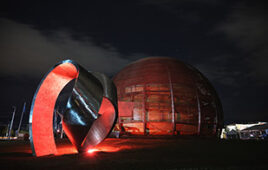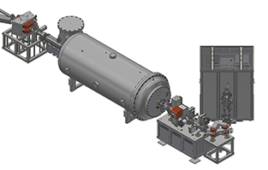 Rensselaer Professor Jie Lian has been awarded $500,000 from the U.S. Department of Energy as part of the Nuclear Energy University Research Program (NEUP) to conduct research and develop new materials that will make advanced nuclear reactors more resilient and economically efficient. Dr. Lian, the principal investigator of the project, will be joined by collaborators Rahul Rahul, Rensselaer Polytechnic Institute; Suvranu De, Florida A&M University-Florida State University; Lu Cai, Idaho National Laboratory Program; Patrick Shower, GE Global Research Center; and Eric Brown, U.S. Army Benét Laboratory.
Rensselaer Professor Jie Lian has been awarded $500,000 from the U.S. Department of Energy as part of the Nuclear Energy University Research Program (NEUP) to conduct research and develop new materials that will make advanced nuclear reactors more resilient and economically efficient. Dr. Lian, the principal investigator of the project, will be joined by collaborators Rahul Rahul, Rensselaer Polytechnic Institute; Suvranu De, Florida A&M University-Florida State University; Lu Cai, Idaho National Laboratory Program; Patrick Shower, GE Global Research Center; and Eric Brown, U.S. Army Benét Laboratory.
The high-temperature corrosion of molten salts presents a unique challenge for the application of structural materials. The current materials for light water reactors will not function well in future extreme reactor environments such as high temperature and radiation and extensive corrosion. Dr. Lian’s team will focus on the research and development of advanced materials that will provide for extended and improved performance, which is critical for those environments.
This project will examine an integrated approach/methodology to design, manufacture, and verify functionally graded metal-ceramic composite coatings on structural alloys with desired interfacial properties by employing high-throughput computation to guide design of coatings, coupled with additive manufacturing to mitigate residual stress and improve corrosion resistance for molten salt reactor (MSR) applications.
Proposed strategies include depositing metallic or ceramic coatings to improve corrosion resistance of Ni-based alloys and stainless steels in hot molten salts. “The high-performance functionally graded coatings on Ni super alloys or stainless steel with transformative performance can greatly benefit the safety and robustness of MSR operation, and significantly reduce expense, as more cost-efficient stainless steel may be utilized for MSR applications,” said Dr. Lian.
This project will focus on scientific principles and demonstration of the approach in harnessing the synergies of high-throughput modeling and additive manufacturing for materials design and demonstration. The developed methodology for coating design, demonstration, and verification combining with high-throughput continuum modeling, combinatorial materials approaches, and additive manufacturing can be applied for a wide range of materials/coatings design for engineering applications beyond MSR technologies.
“Development of advanced materials that can withstand high temperatures, radiation and corrosive environments presents a serious challenge for performance and operation of next-generation reactors. The multidisciplinary team that includes academia, industry and government is bringing together expertise from modeling and computation, advanced manufacturing and materials design and synthesis to address this challenge. I congratulate the team and look forward to the progress they make” said Shekhar Garde, Dean of Engineering at Rensselaer Polytechnic Institute.
This research is closely aligned with the mission of the Advanced Materials and Manufacturing Technologies program to develop and implement the use of new materials that can make advanced reactors more resilient and economically efficient. It is being conducted in close collaboration with two leading industries for additive manufacturing, GE Global Research Center and Benét Laboratory for materials demonstration, and will broaden the impact of the technology developed in the lab for potential engineering applications.
Dr. Jie Lian is a professor in the departments of Mechanical, Aerospace and Nuclear Engineering, and Materials Science and Engineering at Rensselaer Polytechnic Institute.
NEUP supports university-led nuclear energy research and development projects.





Tell Us What You Think!